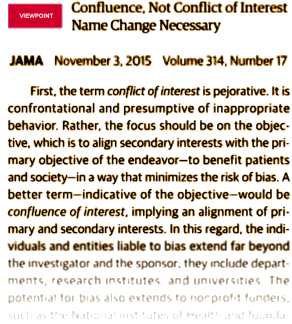 O! be some other name:
O! be some other name:What’s in a name? that which we call a rose
By any other name would smell as sweet;
So Romeo would, were he not Romeo call’d,
Retain that dear perfection which he owes
Without that title.
BMJ9 November 2015Disingenuous denial
JAMA. 2015 314:1791. “Confluence, Not Conflict of Interest” now appears in print, and leads me to break my rule and comment on this article a second time, because I think it marks a low point for JAMA. It aligns the journal with the disingenuous deniers who pretend that conflicts of interest don’t arise when authors and investigators write about work that they have a vested interest in promoting. It joins together JAMA with the NEJM which took a similar stance in a series of opinion papers earlier this year. This is a sort of Republican Tea Party of the soul, where you know you are saying something false and daring people to contradict you, knowing that their very engagement is a form of legitimation. And besides, you have power over them and they don’t over you. Blake called this place Ulro, and it leads to nothing but harm and barrenness — for those involved as well as for everyone else. But it is perfectly possible to get out of Ulro and build a better world.
Given the broad array of stakeholders, the diversity of approaches, and the concern that such policies might restrain innovation and delay translation of basic discoveries to clinical benefit, the Institute for Translational Medicine and Therapeutics at the University of Pennsylvania recently convened an international meeting on conflict of interest…
PharmalotBy Ed SilvermanMarch 1st, 2012The University of Pennsylvania has denied allegations made by one of its professors that several other academics – including his department chair – allowed their names to be added to a medical journal manuscript, but gave control of the contents to GlaxoSmithKline, according to his attorney. The study, which was funded by the drugmaker and the National Institutes of Health, looked at the impact of the Paxil antidepressant on patients with bipolar disorder.
At the same time, the university has acknowledged a claim by the professor, Jay Amsterdam, that the 2001 study was ghostwritten by Scientific Therapeutics Information, his attorney tells us. However, he says the university is not planning on taking any action in connection with the ghostwriting. The study, which was published by the American Journal of Psychiatry [see here], did not mention that STI played any role.
“They said his allegations were not meritorius, although they did find that the publication at issue was ghostwritten,” says Bijan Esfandiari, the attorney, citing a letter and other documents he received from the university. “They acknowledged that a marketing firm was involved in drafting, and everything associated with, the issue. But in response to our complaint, they said that, at the time these events took place, which was between 1998 and 2001, ghostwriting was standard practice and everyone was doing this, so therefore, we’re not going to punish any individuals”…
 While there was, indeed, a lot of corruption in the years around the turn of the century, to dismiss it with something tanamount to "but there was a lot of that going around" as if it were a fad or a pesky virus hardly rises to any reasonable medical or academic standard. It’s an argument as lame as "… such policies might restrain innovation and delay translation of basic discoveries to clinical benefit." Medicine arose in ancient history and survived for centuries not based on powerful scientific advances. Those advances are only in their second century. Medicine prevailed because it was among the few professions that was able to adhere to a consistent and enduring ethical stance. A resistance to outside Conflicts of Interest has been an implied element of that ethic throughout our history. Arguments such as those expressed in this JAMA viewpoint article simply have no place in our tradition or our literature. And to have these recent articles actually advocating for conflicted authorship in our two major journals [NEJM: Revisiting the Commercial–Academic Interface, JAMA: Confluence, Not Conflict of Interest] is cause for alarm…
While there was, indeed, a lot of corruption in the years around the turn of the century, to dismiss it with something tanamount to "but there was a lot of that going around" as if it were a fad or a pesky virus hardly rises to any reasonable medical or academic standard. It’s an argument as lame as "… such policies might restrain innovation and delay translation of basic discoveries to clinical benefit." Medicine arose in ancient history and survived for centuries not based on powerful scientific advances. Those advances are only in their second century. Medicine prevailed because it was among the few professions that was able to adhere to a consistent and enduring ethical stance. A resistance to outside Conflicts of Interest has been an implied element of that ethic throughout our history. Arguments such as those expressed in this JAMA viewpoint article simply have no place in our tradition or our literature. And to have these recent articles actually advocating for conflicted authorship in our two major journals [NEJM: Revisiting the Commercial–Academic Interface, JAMA: Confluence, Not Conflict of Interest] is cause for alarm…
I certainly agree with the sentiment in Richard Lehman’s post, but why do authors insist on including gratuitous, irrelevant swipes at their pet bugaboos like this? Lehman’s “Republican Tea Party of the soul” snark just alienated 30% of the population that sympathizes with the tea party, for what reason? The smug condescension may feel good, but it’s a lousy way to bring converts to your cause.
It also reveals a fundamental misunderstanding of what the Tea Party is. It basically started as a small government, libertarian secular response to cronyism and bailouts in 2008, even though the New York Times, pandering to the financial industry that benefitted from the bailouts, tried to paint that organization as a bunch of religious hillbillies.
Since they loudly denounced TARP, which enriched a few and the expense of many, bring the Tea Party into this is completely inappropriate. The Tea Party would most likely oppose seedy conflicts of interest because that was the motivation for their founding. The Tea Party actually had a bit in common with Occupy at its founding, until Occupy was taken over by the hard left.
If you watch Santelli’s original rant, there’s very little that most people, especially taxpayers, actually disagree with, unless you happen to work for the Treasury Dept or Goldman Sachs.
Jeff is completely right that such gratuitous statements should be shelved since it is tangential and alienating.
The people who oppose these sleazy “synergies” come from all over the political spectrum. Proof of that is the variety of commentators on this blog.
“Proof of that is the variety of commentators on this blog.” A variety I enjoy, though it makes moderating really hard. I really like Richard Lehman, but I almost left that “Tea Party” comment out of quoting him. I think he has a British Understanding of what thatt means without understanding the nuances expressed here.
I lived in England for three years, and never really caught on to the British political sensibilities. I was equally struck with their misunderstanding of ours. Had Lehman chosen another example instead of “Republican Tea Party of the soul” the point he is making would’ve been profound. Jeff said it well, “I certainly agree with the sentiment in Richard Lehman’s post, but …” emphasis on the “but …“.
Richard Lehman’s column in the BMJ usually hones in on the central issues in his journal reviews, but this time he’s especially quick to get to the heart of the matter.
Oh Mickey, please. The phrase is “homes in” as in a homing pigeon. “Hone” means “sharpen” as in “honing a knife.”
Sorry to be a pedant, but I shudder every time I see this usage. (The only one that gets me more is “between you and I.” I have issues. I know.)
Well, you learn something new every day…